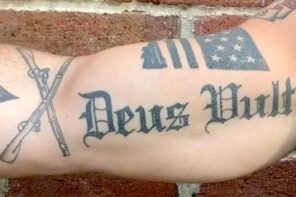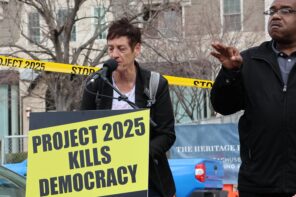Advance chatter about Bill Keller’s Sunday New York Times Magazine article “Asking Candidates Tougher Questions About Faith” made it sound like Keller, the Times‘ executive editor, was proposing something like a religious test that might embarrass candidates who maintain more orthodox or literalistic forms of belief.
The article turned out to do nothing of the sort, despite opening with an implied comparison between religion and belief in space aliens and tossing in a gratuitous reference to Mitt Romney’s underwear. (Really? Can we not get over the underwear meme?)
Keller actually proposed a very moderate line of questioning gauging candidates’ commitment to the values of a pluralistic civil society, even if that commitment cost them the votes of the religiously zealous.
No more doublespeak. No more coded encouragements to extremist religious voters. No more breezily righteous jabs at science. Wrote Keller, “I do care if religious doctrine becomes an excuse to exclude my fellow citizens from the rights and protections our country promises. And I care a lot if a candidate is going to be a Trojan horse for a sect that believes it has divine instructions on how we should be governed.” Amen. And amen.
In addition to posing general questions for all candidates in the article—”Would you appoint a Muslim to the federal bench?” “Do you agree with those religious leaders who say that America is a Christian nation, and what does that mean in practice?”—Keller directed additional questions to individual candidates on a Times blog.
His questions for Romney included: “In your 2007 speech on religion, you said that ‘freedom requires religion just as religion requires freedom.’ Where does that leave unbelievers, in your view?” and “Polls show that there is some resistance to voting for a Mormon. Do you sense that this prejudice is still a factor in the campaign? If so, how do you address it?” Of Huntsman, Keller asked: “Though you were reared Mormon, you have described yourself as ‘not overly religious.’ If not religion, what do you use as your guide in deciding what is right and what is wrong?”
Very reasonable questions. But they sound like softballs to me.
As someone who knows Mormon culture, if I had a chance to sit down with the two Mormon candidates in the 2012 race, this is what I’d ask:
1. In 2008, LDS Church leaders solicited $25,000 donations from wealthy Church members for California’s “Yes on 8” anti-marriage-equality campaign. High-ranking Church leaders even scheduled phone calls with individual members to make the ask in person. Did Church leaders solicit an individual contribution from you to the Yes on 8 campaign or any other anti-marriage-equality initiative? If so, how did you respond? How would you respond in such a situation?
2. Mormonism is an openly patriarchal religious culture—one of the most patriarchal modern cultures on the face of the earth. Your own father is (or was) an extremely powerful and wealthy man with great influence within LDS culture and beyond. How have you personally benefitted from a patriarchal (and therefore exclusionary) religion and culture? How has patriarchy shaped your ability to exercise independent judgment? Have you ever openly disagreed with your father or another male LDS leader? Why or why not?
3. The LDS Church withheld priesthood from men of African descent for more than a century, despite the fact that Church founder Joseph Smith initially ordained African-American men. How were you raised to understand the Church’s priesthood ban, and how do you now view it? Was the LDS Church wrong to withhold priesthood from men of African descent?
As members of a minority religion, Mormons like Romney and Huntsman have learned to be very pragmatic in the way they manage the relationship between personal faith and public decision-making. Both have solid track records of non-theocratic reasoning in business and government life. What they may not have learned to do in the cradle of Mormon religious culture is to be willing to step outside the institutional reward structures they’ve profited from, or to state hard truths that challenge majority opinions within their own circles of power and influence—traits desirable in national leaders.
Gauging character and critical reasoning is not a religious test. Let the questioning begin.




